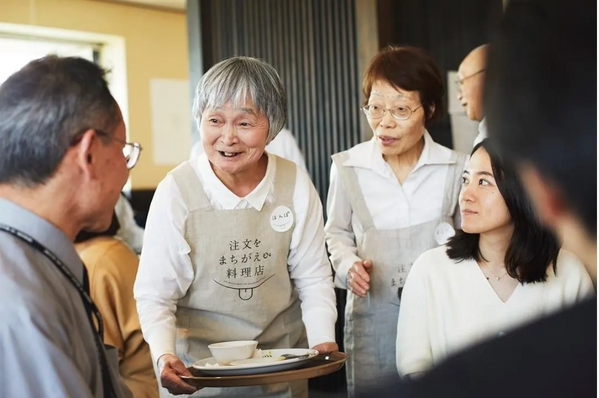
In the United States, as many as one in three older adults report feeling isolated from society, which can lead to depression and feelings of loneliness. Isolation can also increase the likelihood of other ailments, such as heart disease and diabetes. It can even lead to an earlier death.
The loneliness crisis can be seen on a global scale, especially in places where a large portion of the population consists of older adults. In Japan, older adults make up approximately 30% of the population, making it the country with the second-highest proportion of older adults. This staggering statistic has made it necessary for the country to find ways to accommodate this population rather than continue to let them live in isolation. Furthermore, the stigma behind growing old and the misinformation regarding dementia prompted the need for Japan to educate the public about this significant share of the population.
The Concept
One approach that combined both education and integration was the creation of the Restaurant of Mistaken Orders in Japan in 2017. The idea was created by Shiro Oguni after he ordered a burger at a nursing home but received dumplings instead. Rather than sending the “wrong” order back, he accepted the dumplings. Oguni realized that this experience could be viewed as an opportunity to learn about what it is like to have dementia and to treat others with grace. Thus, he created the Restaurant of Mistaken Orders, which is a recurring pop-up restaurant where all the staff members have dementia. In fact, a requirement for a position at the restaurant is to have dementia, regardless of age.
In the concept movie for this restaurant, Oguni remarked, “People believe [those with dementia] can’t do anything for [themselves].” However, his restaurant offers a chance for those with dementia to serve food and take orders, allowing them to combat social isolation and the misconception that people with dementia immediately lose all motor functions. The restaurant also combats other misconceptions about dementia, such as the belief that dementia is a normal part of aging. In fact, dementia is present in some younger adults. In promotional videos, younger servers, although rare, are present, which is a reminder that old age is not a prerequisite for dementia. Young-onset dementia often occurs between the ages of 45 and 65, although some may show symptoms (such as visual problems, memory problems, and personality changes) before then. Customers thus learn about dementia’s diverse presentation.
The experience
For customers worried about paying extra for an order and receiving something drastically different, all items on the menu are the same price, meaning that the customer does not “lose” money. In videos showcasing the restaurant, customers are smiling and laughing alongside the workers. Many customers also claim that they enjoy the atmosphere and appreciate the chance to learn about others living with dementia. Indeed, the restaurant claims that although customers receive the wrong order 37% of the time, 99% of customers leave satisfied.
Similar restaurants
The restaurant’s success has prompted calls for the opening of more locations in Japan and elsewhere. Within Japan, this has inspired the establishment of “Orange Day SENGAWA,” which is a monthly café with a similar premise: workers living with dementia serve pastries and drinks to customers. There have also been similar initiatives in South Korea and in Australia. Additionally, the Restaurant of Mistaken Order’s continued success has allowed it to continue through today, with the next opening on September 20, 2025.
The lesson
The Restaurant of Mistaken Orders is a great example of both educating the community and creating ways to ensure that those living with dementia have continued involvement in society. Although the restaurant has yet to exist in the US, simply taking the time to converse with people living with dementia and learn from their experiences can be another way to prevent them from being isolated. In turn, we can learn more about dementia, making social interaction mutually beneficial.
Sources:
- I went to The Cafe Of Mistaken Orders. This cafe has 1 rule: you must have dementia to work here. | Ajia Mayrock
- The Restaurant Of Mistaken Orders | Forbes
- Home | Restaurant of Mistaken Orders
- Facebook | Restaurant of Mistaken Orders
- The Cafe of Mistaken Orders and its Benefits for Dementia Patients | Peacefully
- Home | Orange Day Sengawa
- Field Listing – Age structure | The World Factbook
- What is young onset dementia? | DementiaUK
